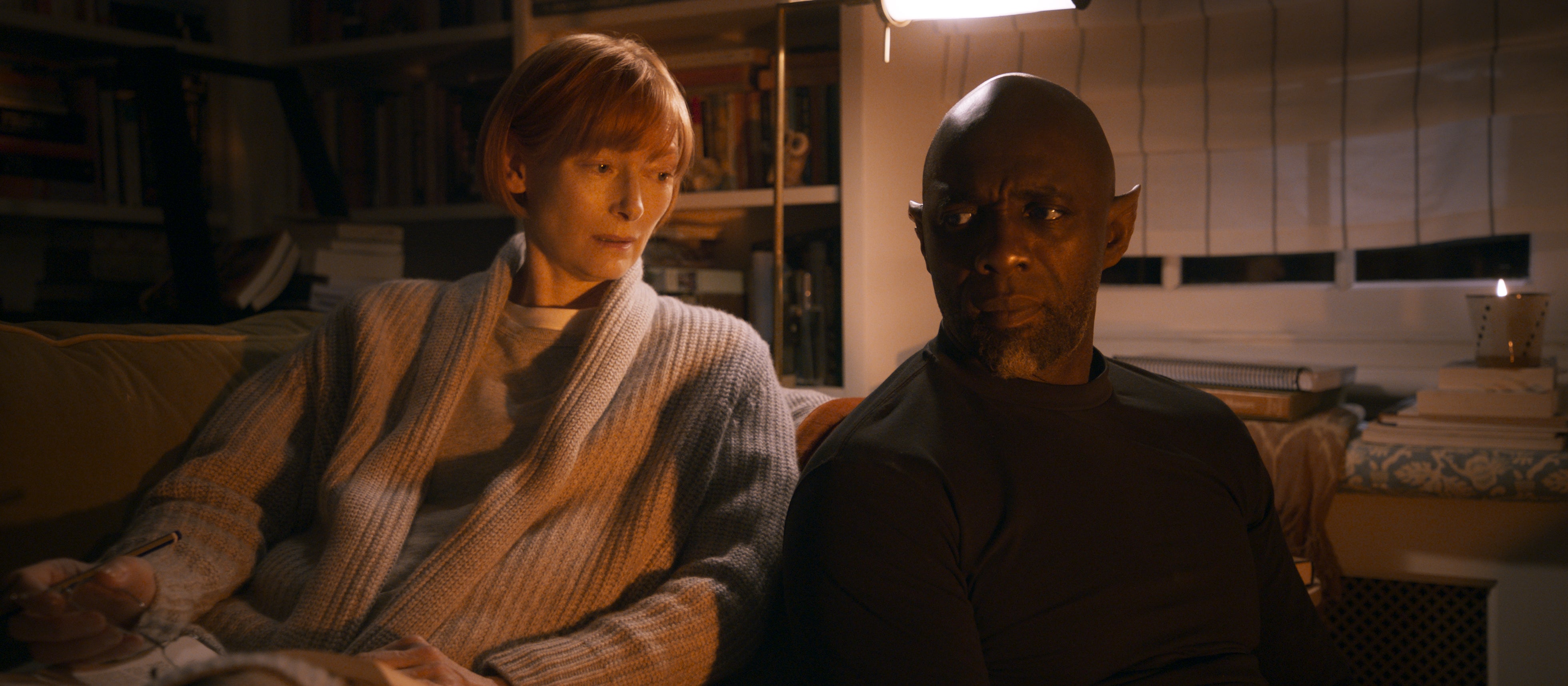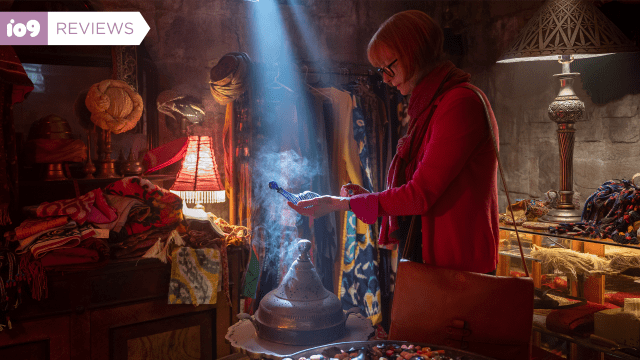Three Thousand Year of Longing, George Miller’s newest film starring Tilda Swinton and Idris Elba, attempts to do the impossible. Skipping across three millennia, Miller’s romantic fantasy is a chamber play, a homage to the fable of Scheherazade, and a meditation on curiosity and storytelling. It’s a romance about truth and power, and what stories get to be powerful. It is, as stories about Djinn and love tend to be, a lot more metaphorical than it has space to explore.
Based on the 1994 novella, The Djinn in the Nightingale’s Eye, the film follows Narratology Professor Alithea Binnie (Swinton) as she travels to Turkey for an academic conference. While shopping in Istanbul, she picks up a glass bottle, which contains a Djinn (Elba). The Djinn attempts to convince Alithea to make three wishes, but her profession is storytelling, and she knows better than most what happens when humans mess with magic.
As the two characters exchange stories in the Istanbul hotel, the narratives come alive on screen. As the Djinn recounts his life of love and loss, we’re transported to the land of Canaan, the ancient Ottoman empire, and medieval Italy. Alithea listens patiently, but convincing her to make a wish proves difficult. The push and pull between the Djinn and Alithea is intriguing, as the power dynamics between the creature of otherworldly magic and the professor seem to shift in favour of one or the other throughout the film.
The style of this movie flits in between grounded conversation and wildly exorbitant fantasy. It’s not unlike Tarsem Singh’s 2006 film, The Fall, where the story and the storyteller pass the narrative along hand over hand, offering reflections and changes as the film progresses. There is something satisfying about watching the theories of storytelling play out on screen, even when the storyteller attempts to justify their own story, their own place in the world. It brings up a lot of questions about storytelling, who gets to tell stories, and what stories become the truth.
Elba, in an interview with Gizmodo, spoke about the power of storytelling. “We’re coming to a juncture where the world is seeing an absolute end to storytelling as we know it. We’re seeing a new dawn,” he said. Audiences are beginning to realise the fallibility of the storyteller. “People in power can tell us a story and completely shift everyone’s perspective for both good and both bad.”
Three Thousand Years of Longing treats storytelling with both reverence and scepticism. Elba continued, “We are that organism that uses stories to move each other. And so that’s why it’s so important that a film like this gives the audience a moment to kind of really think about what they’re reading, who it’s coming from, where it came from, what’s the genesis of it? What would that story feel like in the future if you told it again?” These questions, he stated, are important junctions that can determine the trajectory of the story, and who gets to tell it.

In this sense, director George Miller occupies an interesting place in Three Thousand Years of Longing. He adapted the story from a novella, and his own daughter, Augusta Gore, helped write the screenplay. He’s part interpreter, part crafter, as he focuses on the parts of the story that help him talk about the act of storytelling in cinema. He seems determined to merge the drama of the fantastic with the kind of mundane ache of humanity. One of the horrors of being human is knowing that life will end, sometimes suddenly, only sometimes with grace. One of the threats of being a Djinn is that life might not ever end. Stories, Miller seems to say, exist to take up the space in between.
While movies often interrogate their own storytellers–unreliable narrators are a common and beloved narrative trick–it’s more unusual to have the characters in the movie so aware that they are a part of a story. As Alithea pushes the Djinn to explain himself, to explain all his stories, all his loss, he doesn’t resist her curiosity. Carefully, delicately (so as not to frighten her, perhaps) he relates his story, millennia by millennia, until his little bottle ends up in her hands.
And Alithea, bless her, continues to ask questions, and her curiosity gets the better of her throughout her time with the Djinn. She’s driven by a need to not only understand the Djinn, but to dissect his reasoning. Sure, Alithea thinks, this creature can see that his stories are telling on themselves, that he’s not to be trusted by virtue of his own admission. Swinton agrees, saying that Alithea is a character on the precipice of transformation, and that her curiosity is what jettisons the movie forward. “She comes into the narrative having made all sorts of decisions about the way her life is going to be and she has a certain amount of self-satisfaction and contentment about that. And yet, against all the odds, she actually shifts and changes.”
The strength of Three Thousand Years of Longing is in its own referential nature. A story about stories, about storytellers, and about how stories fit into the modern world. It’s a softly charming film that takes the fantastic and renders it into colours and themes we can easily identify. There are points of this movie that become a little tied up in itself, a little too meta, but it never lasts very long. Alithea is a character that we can all see ourselves in, a reminder that the answer to the question, “what would I do in this story?” is never quite as straightforward as many would make it seem.
